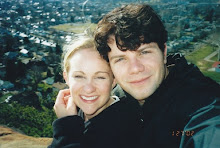"I can't say for certain whether the main postulates of the Christian faith are true. Even though many people try prove them true using logic or empirical evidence, I find such 'proofs' to be severely inadequate and unconvincing. I recognize that my 'personal experience' is insufficient to 'prove' them true to anyone, and that such experience is not at all unique to my faith tradition. In all honesty, I think that a position of uncertainty is probably the most reasonable position a person could take in a discussion of religion, but I personally still think Christianity is closer to truth than other faith traditions...for what it's worth."
OK, so these words aren't actually a quote, but they're a quote I wish I could say I've read from a Christian author, heard from a Christian authority figure, heard preached from a Christian pulpit, or even heard Christians say to me in private. This seems like a perfectly civil way to approach religious difference and the question of uncertainty and doubt. But in my experience, I have rarely, if ever, heard a 'believer' say anything approximating this declaration. In fact, I've often heard quite the opposite, that if one does not declare with certainty, condemn doubt, and experience the divine first hand, then that person has no business calling themselves a 'Christian'. It's entirely possible that this is due to my own personal limited experience and exposure to Christianity in an Evangelical North American setting, but history seems to suggest that this sort of posturing is not unique to Evangelicals (or Christians for that matter!).
My thinking for some time has been that uncertainty is OK, and probably the most intellectually honest position a person could take with themselves and others. Sure, there are practical aspects of 'the gospel' that are easy to buy into (i.e., caring for society's 'least', loving your enemies), but believing that Jesus is God, that he was born of a virgin, or that he was raised from the dead are not at all necessary for those practical aspects to appeal to socially minded humans or to be applied and have functional value in society. I've heard believers and unbelievers alike argue that those practical aspects would not even exist if it were not for Jesus' declarations, and that without belief in Jesus' divinity, they carry no authority. But, even if these are ideas that originated with Jesus (a suggestion that I can accept as potentially true, but probably is not true) they can still be acted upon whether Jesus is divine or not. And, as far as whether anyone would take these suggestions seriously unless Jesus is divine, well, I find that suggestion suspect, since I haven't observed any correlation between 'belief' or 'disbelief' in Jesus' divinity and concern for the 'least'...in fact, quite frequently I've observed what appears to be a complete disregard or even contempt for the 'least' coming from Christians and I've seen 'unbelievers' demonstrate the sort of compassion that I believe Jesus was talking about.
Last year I came across this brief article about T.H. Huxley (AKA 'Darwin's bulldog) and his conception of 'agnosticism'. It discusses his understanding of agnosticism to not be some middling position of indecision, but an assertion that he didn't think we could know some things with certainty...namely whether there was a God, but also that there was no God either. While he tended to think that there was no God, he made no bones about the fact that he was not 'certain' about that thought, thus the article refers to him as the 'agnostic atheist'. While I have no idea about the historical accuracy of this depiction of Huxley's position, it does sound like a reasonable position (for both atheists and believers). And, with that, I'd like to suggest a new category of Christian, the 'agnostic Christian' to refer to a person who hopes some aspects of Christianity are true (i.e., there is a God, he loves us, he intervenes on our behalf even if we don't understand it) or tends to live according to Christian principles (i.e., care for the least, love one's enemies) as a result of this hope, but is entirely comfortable with expressing the uncertainty that is inherent when speaking about things that can not be 'proven' and is perfectly OK with that uncertainty.


